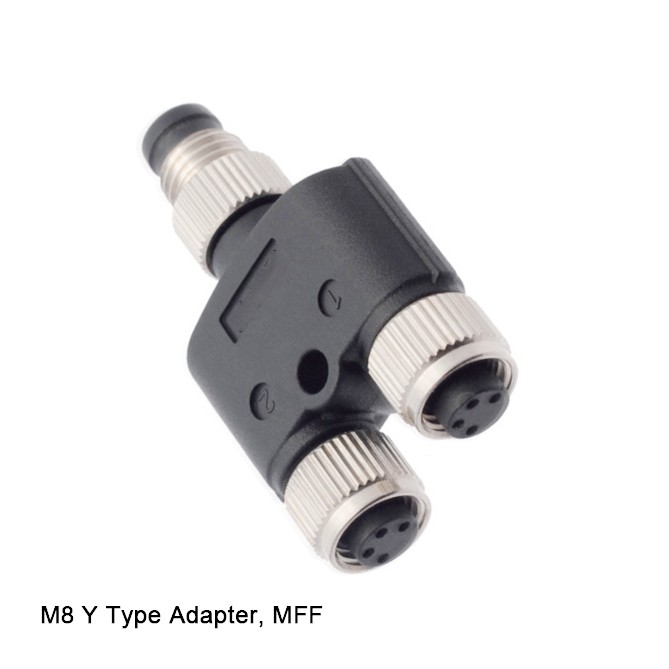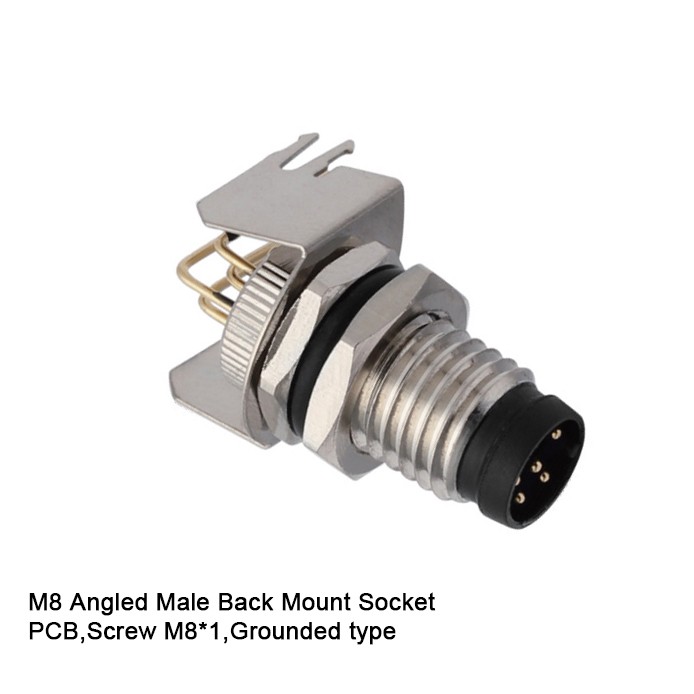Table of Contents
When you’re working in robotics or industrial automation, every component counts.
One of the most vital yet often overlooked parts of a system is the connector.
And when it comes to small, reliable connectors that can handle the demanding environments of robotics, M8 connectors are often the best choice.
But with so many options out there, how do you know which M8 connector is right for your specific needs?
In this guide, I’ll walk you through everything you need to know about selecting the perfect M8 connector for your robotics and automation projects.

6 pin m8 Circular Connector M8 Y Type Adapter, MFF
Why M8 Connectors Are Ideal for Robotics and Automation
Compact Size with Big Impact
I’ve spent my fair share of time dealing with tight spaces in automation systems.
Whether it’s inside a robot arm or squeezed behind a control panel, space is always at a premium.
That’s where M8 connectors come in. With their compact design, these connectors are perfect for small, high-density systems where every millimeter matters.
I remember working on a robot design for a packaging line, where we had to fit connectors in an already cramped electrical compartment.
M8 connectors saved the day.
Their small footprint allowed us to integrate more components without compromising the system’s performance.
It was a game changer.
Durability in Harsh Environments
Robotics and industrial automation aren’t known for their gentle environments.
Vibration, dust, moisture – you name it, these systems have to endure it all.
M8 connectors are built to withstand the rigors of industrial settings.
They come in IP67 and IP68 ratings, meaning they’re protected against dust and can handle immersion in water up to a certain depth.
This makes them ideal for outdoor applications or environments where machinery is exposed to contaminants.
I recall one project where we needed connectors for a robot operating in a food processing plant. With frequent washdowns and exposure to moisture, we couldn’t afford to use anything less than waterproof M8 connectors.
We went with M8 connectors with IP68 ratings, and they performed perfectly, even after months of exposure to the plant’s harsh cleaning cycles.
Understanding the Different Types of M8 Connectors
M8 connectors come in various configurations to suit different needs. Let’s break down the most common ones you’ll encounter.
M8 Male vs. Female Connectors
You’ll typically encounter male and female M8 connectors.
The male connectors have pins that plug into the female connectors, which have sockets.
It’s important to choose the right type depending on your system design.
For instance, I’ve used M8 male connectors on robotic arms, where they were designed to plug into female connectors mounted on the control board.
This setup works great for quick assembly and disassembly in robotic systems.
Straight vs. Right-Angle M8 Connectors
Another consideration is whether to choose straight or right-angle M8 connectors.
Straight connectors are ideal for situations where there’s plenty of room to route cables in a linear direction.
On the other hand, right-angle connectors are perfect for tight spaces where you need to make a 90-degree turn in the cable routing.
I’ve used right-angle M8 connectors when dealing with tight spaces inside control boxes, and they’ve been a real time-saver in terms of cable management.
Pin Configurations: 3, 4, 5, and More Pins
M8 connectors come with varying numbers of pins.
The most common are 3-pin, 4-pin, and 8-pin connectors. The number of pins you need depends on the complexity of your system.
For simple connections like power or signal transmission, a 3-pin M8 connector may be sufficient.
But for systems that require both power and signal (e.g., sensors with feedback), you might opt for a 4-pin M8 connector.
I once worked on an automated assembly line where we used 5-pin M8 connectors to handle both power and communication signals from the conveyor sensors.
Choosing the right pin count is critical for ensuring smooth communication across your robotic systems.
Key Considerations When Choosing M8 Connectors for Robotics and Automation
Environmental Factors
When it comes to selecting M8 connectors, the environmental factors often play the most significant role.
Think about it – if you’re working in a robotics lab, you might have relatively clean, controlled conditions.
But if you’re deploying automation systems on a factory floor or outdoor setting, you’ll need connectors that can stand up to the environment.
M8 connectors with IP67 or IP68 ratings are essential for environments where moisture, dust, or chemicals are a concern.
If you’re using connectors for outdoor robots or machinery in dirty, wet environments, choosing connectors with higher protection ratings ensures longevity and reliability.
I learned this the hard way when a set of lower-rated connectors failed in a high-humidity environment, causing unnecessary downtime.
Electrical Requirements
Each system has its own electrical requirements, so it’s important to choose M8 connectors that match those specifications.
For example, if you’re working with high-voltage robotic systems, you’ll need connectors that can handle those power requirements.
But if you’re working with low-voltage signal applications, a more basic, lightweight M8 connector might be all you need.
When working on an automation system for a robotics application, I’ve had to carefully evaluate the current and voltage needs of the robot’s sensors.
In one instance, I used M8 connectors that supported higher voltage ratings to ensure the robotic arm would operate smoothly under heavy loads.
So always check the electrical ratings before making your purchase.
Mechanical Durability
Robotic systems often operate in demanding conditions, with lots of movement, vibration, and shock.
M8 connectors are well-suited for this because they offer mechanical durability, ensuring that the connections remain intact over time.
Whether your application requires vibration resistance or high durability, M8 connectors are designed to last.
How to Choose the Right M8 Connector for Your Application
For Robotic Arms and Grippers
If you’re working with robotic arms or grippers, you’ll need connectors that can handle both power and signal transmission.
Look for M8 connectors with 4 or 5 pins, as they’ll support the complex systems needed for precise movement and control.
For Machine Vision Systems
When designing for machine vision, high-speed data transmission is critical.
Choose M8 connectors with gold-plated contacts and an IP67 or IP68 rating for reliability in harsh conditions.
For Outdoor Automation Systems
If your robot or automation system operates outdoors, you’ll need connectors that are waterproof, dustproof, and vibration-resistant.
M8 connectors with high protection ratings (IP67 or IP68) will ensure that your system performs reliably, even in the rain or dusty environments.
Where to Buy High-Quality M8 Connectors
When purchasing M8 connectors for your robotics and automation systems, it’s important to choose a trusted supplier that offers high-quality connectors with the specifications you need.
Look for suppliers that specialize in industrial-grade components and have a solid reputation for customer service.
I’ve found that purchasing in bulk can also save time and money for large-scale projects.
Many suppliers offer discounts for bulk orders, which is something to consider when sourcing M8 connectors for larger robotics installations.

Right Angle m8 pcb Connector M8 Back Mount Socket
Conclusion
Choosing the right M8 connector for your robotics and automation systems may seem like a small decision, but it can make a huge impact on the performance, reliability, and longevity of your systems.
Always consider the environmental conditions, electrical requirements, and mechanical durability when selecting M8 connectors, and take the time to choose the right type and configuration for your application.
If you’re unsure, don’t hesitate to consult with your supplier or connector experts—they can provide valuable advice to ensure that your system runs smoothly for years to come.
Happy connecting!
M8 Connectors Related Blog
The Complete Guide to Choosing M8 Connectors for Robotics and Automation
M8 Panel Mount Connectors: Secure Connections for Industrial Devices
Introduction to M8 Connectors: Versatile Solutions for Industrial Applications
A Guide to M8 Connectors: What You Need to Know